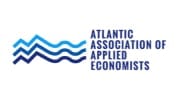
The AAAE is pleased to present its annual Early-Career Economists’ Panel
Please come and support the next generation of economists as this event is a rewarding professional development opportunity for early-career economists as they deliver a wide range of research topics.
Panelists:
Fabiana Rosado – Senior Policy Analyst, Nova Scotia Department of Finance and Treasury Board
“Brain Waste: Job-education mismatch of skilled immigrants in Canada. A national and regional analysis.”
Canada benefits yearly from the brain gain of immigrants who are admitted in the country based on their human capital, but to what extent are they utilizing their formal education in the labour market? From a labour market perspective, it’s important for immigrants to utilize their education in their subsequent occupations to ensure economic integration, labour productivity, and economic development. Using Census 2016, we investigate whether immigrants work in occupations that match their education or whether they are mismatched due to over/undereducation in the labour market at the national and regional level. The multinomial logistic analysis shows that immigrants from specific source regions are more likely than others to be over/undereducated for their occupation. The latter indicates immigrants are overachieving in their occupation. The former implies brain waste. At the regional level, immigrants in Atlantic Canada have a higher likelihood of a job-education match compared to other Canadian regions.
Cherise Elizabeth Millar – Labour Market Analyst, Automotive Sector Council of Nova Scotia and Statistical Assistant at the Research Data Centre, Dalhousie University
“A Comparative Analysis of the Impacts of Immigrant and Native-Born Labour Force on Economic Growth in Canada”
The project quantifiably examined the contribution to economic growth from natives, established and recent immigrants across the ten Canadian Provinces from 2006 – 2019. Panel data techniques were used in the analysis. The research discovered the strongest effects (+0.15) on economic growth from native-born workers were from Newfoundland and Labrador in Skill B jobs. However, Skill D jobs showed the strongest effects (+0.13) on economic growth from established immigrants in Ontario and Skill D jobs showed the strongest effects (+0.04) on economic growth from recent immigrants in Quebec. On the other hand, the weakest effects (-2.747) and (-4.147) on economic growth from native-borns and established immigrants who worked in Skill D jobs were shown within the province of Prince Edward Islands and recent immigrants who worked Skill A jobs showed the weakest effects (-0.16) across British Columbia.
Dillan Jean Jacques – Economist, Gardiner Pinfold Consulting Inc.
“The Determination of Housing Prices: Evidence from Halifax”
This paper uses a dynamic factor model to determine short run changes of housing prices in Halifax. Halifax housing price determination was based on a contemporary dataset built mainly from Statistics Canada and Teranet-National Bank House Price Index Report. Variables with short term influence were selected that may explain the direction and magnitude of changes in Halifax housing prices. An autoregressive distributed lag (ARDL), regularized by elastic-net and Newey West estimation frameworks generated results that aided in ascertaining Halifax housing prices.
Beth Madsen – Economist, Atlantic Provinces Economic Council (APEC)
“Impact of the 2018-2019 US-China Trade War on Lobster Trade in Canada”
My research analyzes the impact of the 2018-2019 US-China trade war on lobster trade in Canada. I use a gravity model specification, specifically a PPML model, on bilateral trade data from 2014-2021 to estimate the impact on the Canadian trade market. Through my research I have found hat the trade war did have a negative impact on lobster trade with the United States, and a small positive effect on trade with China.
Click on the topics above to download the slides in PDF format
CABE provides this information as a service to our members. Materials shown in the slides and/or video have been provided with the permission of the speaker(s). All rights belong to them unless otherwise indicated. CABE is not responsible for the accuracy or content of information contained. CABE is not responsible for, and expressly disclaims all liability for, damages of any kind arising out of use, reference to, or reliance on any information contained within this website.